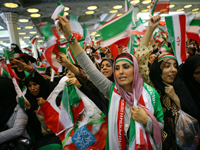Registration
You will receive an email confirming your registration.
President Obama provided strong condemnation of the violence in Iran at a recent White House press briefing. As the president spoke, Carnegie hosted leading Iran experts Ambassador Nicholas Burns, Abbas Milani, and Karim Sadjadpour to discuss the aftermath of the election and its implications for U.S. foreign policy in the region. David Ignatius moderated the discussion.
June 12 Elections Were Conducted Under a Cloud of Improprieties
Emerging data overwhelmingly indicates that the presidential elections were fraudulent.
- Ayatollah Khamenei, his son, and the senior leadership of the Revolutionary Guards (IRGC) planned and orchestrated the stolen election, according to Milani.
- The involvement of the IRGC reflects the growing militarization of Iranian politics. The vast majority of government positions are now held by senior members of the IRGC.
A Divided Regime
Powerful members of the establishment—including former president Akbar Hashemi Rafsanjani and Grand Ayatollah Hussein-Ali Montazeri—have sided with the opposition against the Supreme Leader. Regardless of which camp eventually prevails, divisions among regime leaders have fundamentally changed the nature of the Islamic Republic.
- The Supreme Leader, whose word previously was law, has been called a liar and a dictator by Iranian citizens and his clerical peers. The era of power without accountability for the Supreme Leader may be over.
- Prolonged massive repression by the regime may prove difficult, given past evidence that the IRGC rank and file are sympathetic to reformists and cannot necessarily be relied upon to perpetrate wide-scale violence against the Iranian people.
- Over the long-term, this division among elites—often the most important factor in regime transitions—may herald the beginning of the end of the Islamic Republic as it is today.
New Phase for the Opposition
Dwindling crowds in the street after a week of violent repression do not necessarily signal the demise of the opposition.
- Mir-Hossein Mousavi, the movement’s de facto leader, has shown tremendous fortitude in refusing to back down to the regime and is unlikely to reverse course soon.
- The opposition is entering a new phase with calls for a nationwide strike. It will begin targeting the economic pillars of the regime—the powerful merchant class and the oil industry.
U.S. Should Continue Cautious Response
For now, the United States should let events in Iran unfold. If the administration inserts itself into Iran’s internal drama it risks playing into the regime’s attempt to paint the demonstrations as the product of foreign agents. But the administration should not rush to negotiate before the election fallout is resolved, which would confer undeserved legitimacy on Ahmadinejad.
“President Obama has handled this crisis superbly. He has not received enough credit for how thoughtful, measured, and serious he has been,” Burns concluded. “If we insert ourselves into this crisis we hurt the reformists and help Ahmadinejad.”
